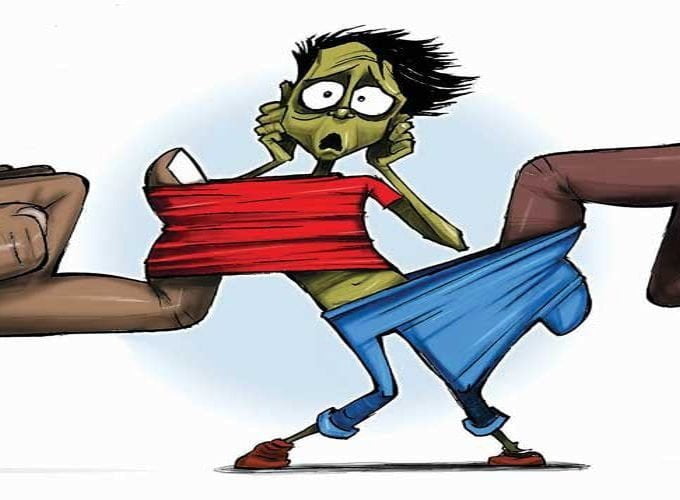Abstract: Domestic violence enhancement refers to the increased penalties and punishment that an offender receives if the crime committed involves domestic violence. In this blog post, we will provide a detailed explanation of domestic violence enhancement, its history, and legal implications. We will also discuss the types of domestic violence crimes that can be enhanced and the factors that courts consider when determining the severity of the crime. Additionally, we will examine the impact of domestic violence enhancement on victims and offenders, as well as the programs available to help them.
Domestic violence enhancement
Domestic violence enhancement is a legal concept that aims to increase the severity of punishment for offenders who commit crimes involving domestic violence. It is a way to hold perpetrators accountable for their actions and to provide increased protection for victims. In this blog post, we will provide a comprehensive guide to understanding domestic violence enhancement, including its history, legal implications, types of crimes that can be enhanced, factors considered in determining the severity of the crime, impact on victims and offenders, and available programs for victims and offenders.
Definition of Domestic Violence Enhancement
Domestic violence enhancement is a legal provision that increases the penalties and punishment for a crime if it is committed in the context of domestic violence. It is based on the idea that domestic violence is a serious crime that requires a strong and effective response from the criminal justice system. Domestic violence enhancement is designed to send a message that such behavior will not be tolerated and that offenders will be held accountable for their actions.
History of Domestic Violence Enhancement
Domestic violence enhancement has its roots in the feminist movement of the 1970s, which focused on raising awareness about domestic violence as a serious social problem. This led to changes in the law to provide greater protection for victims and to hold offenders accountable. The first domestic violence enhancement law was passed in California in 1984, and since then, most states have enacted similar legislation.
Legal Implications of Domestic Violence Enhancement
Domestic violence enhancement has important legal implications for both victims and offenders. For victims, it means that they are more likely to receive protection and justice when they report abuse. For offenders, it means that they face more severe penalties and punishment for their actions, including longer prison sentences, higher fines, and mandatory counseling and treatment.
Types of Domestic Violence Crimes that can be Enhanced
Domestic violence can take many forms, and different types of crimes can be enhanced under domestic violence enhancement laws. Here are some examples:
Physical Abuse
- Hitting, Punching, and Slapping: These are common forms of physical abuse that can result in serious injury or even death.
- Strangulation and Suffocation: These are extremely dangerous forms of physical abuse that can lead to brain damage, paralysis, or death.
- Use of Weapons: Domestic violence involving weapons is especially dangerous, and can result in severe injury or death.
- Forced Confinement: This involves restraining or imprisoning a victim, which can cause severe psychological trauma.
- Sexual Assault: Sexual assault is a form of physical abuse that involves any unwanted sexual contact, including rape.
- Stalking and Harassment: These are forms of physical abuse that involve repeatedly following or harassing a victim, which can cause severe psychological trauma.
- Financial Abuse: This involves controlling a victim’s finances, which can lead to economic hardship and dependence.
Psychological Abuse
- Threats and Intimidation: These are common forms of psychological abuse that can cause severe emotional distress.
- Gaslighting: Gaslighting is a form of psychological abuse that involves manipulating a victim into doubting their own perception of reality.
- Isolation and Exclusion: This involves cutting off a victim from friends and family, which can cause severe psychological distress.
- Verbal Abuse: This involves using language to hurt, humiliate, or degrade a victim, which can cause severe emotional distress.
- Mind Games: Mind games involve psychological manipulation to control or confuse a victim, which can cause severe emotional distress.
- Controlling Behaviors: These are behaviors that limit a victim’s freedom or independence, which can cause severe psychological distress.
- Denial and Blame-Shifting: The abuser may deny that they are doing anything wrong or blame the victim for their behavior. This can make the victim feel like they are responsible for the abuse.
Factors Considered in Determining the Severity of the Crime
The severity of the crime and the punishment that an offender faces under domestic violence enhancement laws depend on several factors, including:
- The Degree of Harm to the Victim
The degree of harm inflicted on the victim is a crucial factor in determining the severity of the crime. More severe injuries or harm to the victim will result in harsher punishment for the offender.
- The Perpetrator’s Criminal History
The offender’s criminal history is another important factor in determining the severity of the crime. Offenders with a history of domestic violence or other violent crimes are more likely to receive enhanced punishment.
- The Presence of Aggravating Factors
Aggravating factors, such as the use of weapons or the involvement of a child, can also lead to enhanced punishment for the offender.
Impact on Victims and Offenders
Domestic violence enhancement laws can have a significant impact on both victims and offenders. Here are some examples:
- Impact on Victims
Domestic violence enhancement laws can provide greater protection and justice for victims of domestic violence. Victims are more likely to receive the help and support they need to recover from abuse, and offenders are more likely to be held accountable for their actions.
- Impact on Offenders
Domestic violence enhancement laws can also have a positive impact on offenders. They may be more likely to receive counseling and treatment to address the underlying issues that led to their abusive behavior. This can help reduce the likelihood of future abuse and promote rehabilitation.
Available Programs for Victims and Offenders
There are several programs available for victims and offenders of domestic violence. These programs aim to provide support and resources for victims and to promote accountability and rehabilitation for offenders.
Programs for Victims
- Domestic Violence Hotlines: Hotlines provide a way for victims to get help and support from trained professionals.
- Shelters and Safe Houses: These provide a safe place for victims to go to escape abuse.
- Counseling and Support Groups: These programs provide emotional support and guidance for victims as they recover from abuse.
- Legal Assistance: Legal assistance programs can help victims navigate the legal system and obtain protective orders or other legal remedies.
- Financial Assistance: Financial assistance programs can help victims access the resources they need to rebuild their lives.
- Advocacy and Education: Advocacy and education programs work to raise awareness about domestic violence and to promote policies that provide greater protection for victims.
- Healthcare: Healthcare providers can play a crucial role in identifying and responding to domestic violence, providing medical care, and referring patients to other resources.
Programs for Offenders
- Batterer Intervention Programs: These programs aim to help offenders address the underlying issues that led to their abusive behavior.
- Counseling and Treatment: Offenders may be required to undergo counseling or treatment to address substance abuse, mental health issues, or other factors that contributed to their abusive behavior.
- Probation and Supervision: Offenders may be placed on probation or supervised release, which can include regular check-ins with a probation officer or other restrictions.
- Community Service: Offenders may be required to perform community service as a way to make amends for their actions.
- Education and Awareness: Programs aimed at educating offenders about the impact of domestic violence can be effective in promoting accountability and rehabilitation.
- Restorative Justice: Restorative justice programs aim to repair the harm caused by domestic violence by involving victims, offenders, and the community in a process of healing and reconciliation.
- Employment and Housing Assistance: Offenders may be eligible for assistance in finding employment or housing, which can help promote stability and reduce the likelihood of future abuse.
Conclusion
- Domestic violence enhancement is a critical legal concept that aims to provide greater protection and justice for victims of domestic violence. It provides harsher punishment for offenders who commit acts of domestic violence, taking into account the severity of the crime and the offender’s history and other aggravating factors.
- Domestic violence enhancement laws can have a positive impact on both victims and offenders. Victims are more likely to receive the help and support they need to recover from abuse, and offenders may be more likely to receive counseling and treatment to address the underlying issues that led to their abusive behavior. This can help reduce the likelihood of future abuse and promote rehabilitation.
- There are several programs available for victims and offenders of domestic violence that aim to provide support and resources for victims and to promote accountability and rehabilitation for offenders. Domestic violence hotlines, shelters and safe houses, counseling and support groups, legal assistance, financial assistance, advocacy and education, healthcare, batterer intervention programs, counseling and treatment, probation and supervision, community service, education and awareness, restorative justice, and employment and housing assistance are all examples of available programs.
In conclusion, domestic violence enhancement laws and programs play a crucial role in promoting the safety and well-being of victims of domestic violence, holding offenders accountable for their actions, and promoting rehabilitation and a reduction in the likelihood of future abuse. It is important to continue to raise awareness about domestic violence and to provide the necessary resources and support to those who are affected by it.
Last worded from author
Domestic violence is a serious issue that affects millions of people around the world, and domestic violence enhancement laws are an important tool in protecting victims and holding offenders accountable. By providing harsher punishment for offenders and promoting rehabilitation and resources for victims, we can work towards a future where domestic violence is no longer tolerated or accepted. It is crucial that we continue to raise awareness and provide support for victims and offenders alike in order to create a safer and more just society for all.
FAQs
Domestic violence enhancement laws provide harsher punishment for offenders who commit acts of domestic violence, taking into account the severity of the crime and the offender’s history and other aggravating factors.
Domestic violence refers to any form of abuse or violence, including physical, sexual, emotional, and financial abuse, that occurs between individuals who are or have been in a domestic relationship.
Anyone can be a victim of domestic violence, regardless of their age, gender, sexual orientation, race, or socioeconomic status.
If you are a victim of domestic violence, it is important to seek help and support. You can contact a domestic violence hotline, seek shelter at a safe house, talk to a counselor or therapist, and seek legal assistance.
Domestic violence enhancement laws can help reduce the likelihood of future abuse by providing harsher punishment for offenders and promoting rehabilitation and resources for victims.
There are several resources available for victims and offenders of domestic violence, including hotlines, shelters and safe houses, counseling and support groups, legal assistance, financial assistance, advocacy and education, healthcare, batterer intervention programs, counseling and treatment, probation and supervision, community service, education and awareness, restorative justice, and employment and housing assistance.
You can help prevent domestic violence by speaking out against it, supporting victims, promoting healthy relationships, and educating others about the signs and effects of domestic violence. Additionally, if you suspect that someone you know is a victim of domestic violence, it is important to offer support and encourage them to seek help.
References
- National Domestic Violence Hotline: https://www.thehotline.org/
- National Coalition Against Domestic Violence: https://ncadv.org/
- National Network to End Domestic Violence: https://nnedv.org/
- U.S. Department of Justice, Office on Violence Against Women: https://www.justice.gov/ovw/domestic-violence
- National Resource Center on Domestic Violence: https://nrcdv.org/
- Futures Without Violence: https://www.futureswithoutviolence.org/
Also Read







